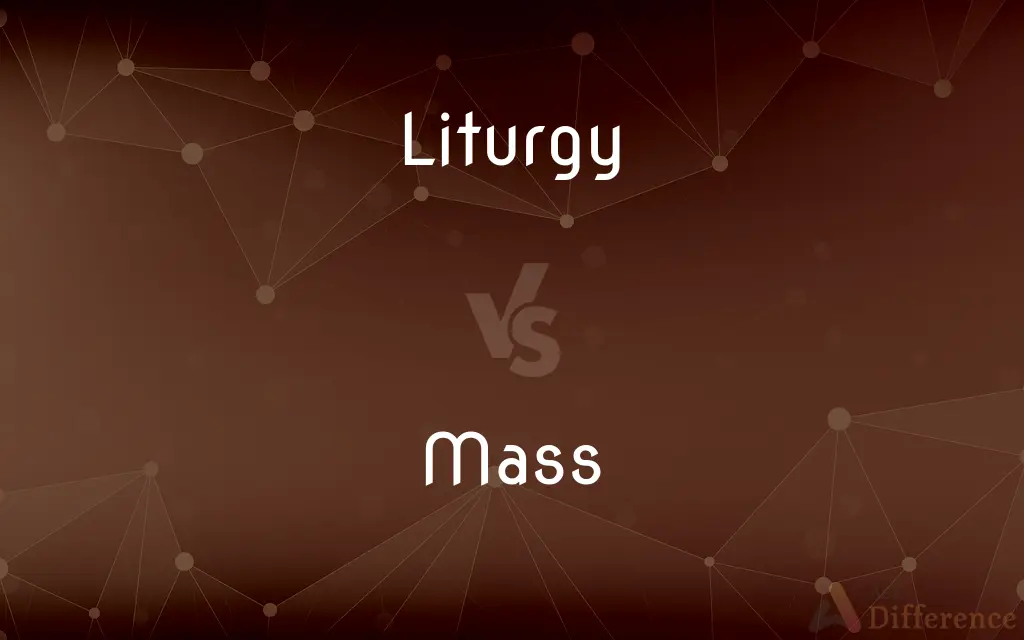Liturgy vs. Mass — What's the Difference?
By Fiza Rafique & Maham Liaqat — Updated on March 31, 2024
Liturgy refers to the set form of public worship, encompassing various religious ceremonies, while Mass specifically denotes the Christian (primarily Catholic) celebration of the Eucharist.

Difference Between Liturgy and Mass
Table of Contents
ADVERTISEMENT
Key Differences
Liturgy encompasses a broad range of public worship practices and rituals within various religious traditions, serving as a structured framework for communal worship. It includes prayers, readings, and rituals intended to facilitate a communal response to and participation in the sacred through acts of public worship. Whereas, Mass is a term specifically used within the Christian tradition, particularly in the Roman Catholic Church, to describe the celebration of the Eucharist—the ceremonial commemoration of Jesus Christ's Last Supper with his disciples.
The concept of liturgy extends beyond the Christian context to include the structured forms of worship found in other religions, such as Judaism and Islam, which have their own liturgical traditions. In contrast, the Mass is inherently Christian, with its rituals, prayers, and structure deeply rooted in Christian theology and the narrative of salvation.
The Mass, as a form of liturgy, is distinguished by its focus on the Eucharist as the source and summit of Christian life, according to Catholic doctrine. It is a celebration that reenacts the Last Supper, involves the consecration of the bread and wine, and includes the participation of the faithful through receiving Holy Communion. On the other hand, liturgical services that are not Mass might focus on different aspects of faith, such as the Liturgy of the Hours, which revolves around the recitation of psalms and scripture readings.
In essence, while all Masses are liturgies, not all liturgies are Masses. This distinction highlights the specific role of the Eucharist within the broader context of worship practices and emphasizes the variety of liturgical expressions across and within religious traditions.
Comparison Chart
Definition
A set form of public worship or ritual.
The Christian celebration of the Eucharist.
ADVERTISEMENT
Tradition
Various religious traditions.
Primarily Roman Catholic and some Christian denominations.
Focus
Broad, including prayers, readings, and rituals.
Specifically centered around the Eucharist.
Context
Can be applied to non-Christian religions.
Inherently Christian.
Key Elements
Structure and response in communal worship.
Consecration of bread and wine, Holy Communion.
Compare with Definitions
Liturgy
Established religious practices.
The liturgy has evolved but retains its sacred core.
Mass
The service of Christian worship at which the Eucharist is celebrated.
They attend Mass every Sunday.
Liturgy
A set pattern of religious ceremonies.
The liturgy of the service was meticulously planned.
Mass
Commemorating Jesus’ Last Supper.
The Mass reenacts the Last Supper's sacramental meal.
Liturgy
An official religious service.
She loves the solemnity of the liturgy during Easter.
Mass
A service involving sacred rituals.
The consecration of the bread and wine is essential to the Mass.
Liturgy
The communal practice of religious worship.
The church's liturgy includes hymns and prayers.
Mass
A key Catholic practice.
The Mass is the highest form of worship in the Catholic Church.
Liturgy
Collective participation in prayer.
The congregation participates in the liturgy with deep faith.
Mass
Mass is both a property of a physical body and a measure of its resistance to acceleration (rate of change of velocity with respect to time) when a net force is applied. An object's mass also determines the strength of its gravitational attraction to other bodies.
Liturgy
Liturgy is the customary public worship performed by a religious group. As a religious phenomenon, liturgy represents a communal response to and participation in the sacred through activities reflecting praise, thanksgiving, remembrance, supplication or repentance.
Mass
The celebration of the Christian Eucharist, especially in the Roman Catholic Church
We went to Mass
Liturgy
A prescribed form or set of forms for public religious worship.
Mass
Involving or affecting large numbers of people or things
A mass exodus of refugees
The film has mass appeal
Liturgy
Often Liturgy(Christianity) The sacrament of the Eucharist.
Mass
Assemble or cause to assemble into a single body or mass
Both countries began massing troops in the region
Clouds massed heavily on the horizon
Liturgy
A predetermined or prescribed set of rituals that are performed, usually by a religion.
Mass
Public celebration of the Eucharist in the Roman Catholic Church and some Protestant churches.
Liturgy
An official worship service of the Christian church.
Mass
The sacrament of the Eucharist.
Liturgy
(historical) In Ancient Greece, a form of personal service to the state.
Mass
A musical setting of certain parts of the Mass, especially the Kyrie, Gloria, Credo, Sanctus, and Agnus Dei.
Liturgy
An established formula for public worship, or the entire ritual for public worship in a church which uses prescribed forms; a formulary for public prayer or devotion. In the Roman Catholic Church it includes all forms and services in any language, in any part of the world, for the celebration of Mass.
Mass
A unified body of matter with no specific shape
A mass of clay.
Liturgy
A Christian sacrament commemorating the Last Supper by consecrating bread and wine
Mass
A grouping of individual parts or elements that compose a unified body of unspecified size or quantity
"Take mankind in mass, and for the most part, they seem a mob of unnecessary duplicates" (Herman Melville).
Liturgy
A rite or body of rites prescribed for public worship
Mass
A large but nonspecific amount or number
A mass of bruises.
Mass
A lump or aggregate of coherent material
A cancerous mass.
Mass
The principal part; the majority
The mass of the continent.
Mass
The physical volume or bulk of a solid body.
Mass
Abbr. m(Physics) A property of matter equal to the measure of the amount of matter contained in or constituting a physical body that partly determines the body's resistance to changes in the speed or direction of its motion. The mass of an object is not dependent on gravity and therefore is different from but proportional to its weight.
Mass
An area of unified light, shade, or color in a painting.
Mass
(Pharmacology) A thick, pasty mixture containing drugs from which pills are formed.
Mass
Masses The body of common people or people of low socioeconomic status
"Give me your tired, your poor, / Your huddled masses yearning to breathe free" (Emma Lazarus).
Mass
To gather or be gathered into a mass.
Mass
Of, relating to, characteristic of, directed at, or attended by a large number of people
Mass education.
Mass communication.
Mass
Done or carried out on a large scale
Mass production.
Mass
Total; complete
The mass result is impressive.
Mass
(physical) Matter, material.
Mass
A quantity of matter cohering together so as to make one body, or an aggregation of particles or things which collectively make one body or quantity, usually of considerable size.
Mass
(obsolete) Precious metal, especially gold or silver.
Mass
(physics) The quantity of matter which a body contains, irrespective of its bulk or volume. It is one of four fundamental properties of matter. SI unit of mass: kilogram.
Mass
(pharmaceutical drug) A medicinal substance made into a cohesive, homogeneous lump, of consistency suitable for making pills; as, blue mass.
Mass
(medicine) A palpable or visible abnormal globular structure; a tumor.
Mass
(bodybuilding) Excess body weight, especially in the form of muscle hypertrophy.
Mass
(proscribed) weight
Mass
A large quantity; a sum.
Mass
Bulk; magnitude; body; size.
Mass
The principal part; the main body.
Mass
A large body of individuals, especially persons.
The mass of spectators didn't see the infraction on the field.
A mass of ships converged on the beaches of Dunkirk.
Mass
(in the plural) The lower classes of persons.
The masses are revolting.
Mass
(Christianity) The Eucharist, now especially in Roman Catholicism.
Mass
(Christianity) Celebration of the Eucharist.
Mass
The sacrament of the Eucharist.
Mass
A musical setting of parts of the mass.
Mass
(transitive) To form or collect into a mass; to form into a collective body; to bring together into masses; to assemble.
Mass
(intransitive) To assemble in a mass
Mass
To celebrate mass.
Mass
Involving a mass of things; concerning a large quantity or number.
There is evidence of mass extinctions in the distant past.
Mass
Involving a mass of people; of, for, or by the masses.
Mass unemployment resulted from the financial collapse.
Mass
The sacrifice in the sacrament of the Eucharist, or the consecration and oblation of the host.
Mass
The portions of the Mass usually set to music, considered as a musical composition; - namely, the Kyrie, the Gloria, the Credo, the Sanctus, and the Agnus Dei, besides sometimes an Offertory and the Benedictus.
Mass
A quantity of matter cohering together so as to make one body, or an aggregation of particles or things which collectively make one body or quantity, usually of considerable size; as, a mass of ore, metal, sand, or water.
If it were not for these principles, the bodies of the earth, planets, comets, sun, and all things in them, would grow cold and freeze, and become inactive masses.
A deep mass of continual sea is slower stirredTo rage.
Mass
A medicinal substance made into a cohesive, homogeneous lump, of consistency suitable for making pills; as, blue mass.
Mass
A large quantity; a sum.
All the mass of gold that comes into Spain.
He had spent a huge mass of treasure.
Mass
Bulk; magnitude; body; size.
This army of such mass and charge.
Mass
The principal part; the main body.
Night closed upon the pursuit, and aided the mass of the fugitives in their escape.
Mass
The quantity of matter which a body contains, irrespective of its bulk or volume.
Mass
To celebrate Mass.
Mass
To form or collect into a mass; to form into a collective body; to bring together into masses; to assemble.
But mass them together and they are terrible indeed.
Mass
The property of a body that causes it to have weight in a gravitational field
Mass
(often followed by `of') a large number or amount or extent;
A batch of letters
A deal of trouble
A lot of money
He made a mint on the stock market
It must have cost plenty
Mass
An ill-structured collection of similar things (objects or people)
Mass
(Roman Catholic Church and Protestant Churches) the celebration of the Eucharist
Mass
A body of matter without definite shape;
A huge ice mass
Mass
The common people generally;
Separate the warriors from the mass
Power to the people
Mass
The property of something that is great in magnitude;
It is cheaper to buy it in bulk
He received a mass of correspondence
The volume of exports
Mass
A musical setting for a Mass;
They played a Mass composed by Beethoven
Mass
A sequence of prayers constituting the Christian eucharistic rite;
The priest said Mass
Mass
Join together into a mass or collect or form a mass;
Crowds were massing outside the palace
Mass
Occurring widely (as to many people);
Mass destruction
Mass
Gathered or tending to gather into a mass or whole;
Aggregate expenses include expenses of all divisions combined for the entire year
The aggregated amount of indebtedness
Common Curiosities
What distinguishes Mass from other liturgies?
Mass specifically refers to the Christian celebration of the Eucharist, distinct with its focus on the sacrament.
Can liturgy occur outside of a Mass?
Yes, liturgy encompasses various forms of worship and rituals, not limited to the Mass.
Is the Mass exclusive to the Catholic Church?
While predominantly associated with the Catholic Church, the Mass is also celebrated in some other Christian denominations.
What is the significance of liturgical rituals?
Liturgical rituals provide a way to express faith collectively, reinforce religious identity, and engage with sacred traditions.
Can anyone participate in the liturgy?
Participation in liturgical services is generally open to all, though receiving Holy Communion in the Mass may require adherence to specific religious prerequisites.
How is liturgy important in religions other than Christianity?
Liturgy in other religions provides a structured approach to worship and spiritual practices, facilitating communal engagement with the divine.
Is there a specific structure to the Mass?
Yes, the Mass has a specific structure, including the Liturgy of the Word, Liturgy of the Eucharist, and rites of Communion.
What is liturgy?
Liturgy refers to the structured form of public worship across various religions.
Are there different types of liturgies within Christianity?
Yes, Christianity encompasses a variety of liturgical traditions, including the Liturgy of the Hours, baptismal rites, and more.
How do liturgical practices vary between religions?
Practices vary widely, reflecting theological differences, cultural influences, and historical developments within each religion.
How do people prepare for liturgy?
Preparation may involve personal prayer, fasting, or other spiritual practices, depending on the religious tradition.
How does liturgy connect believers with their faith?
Through ritual, prayer, and communal worship, liturgy deepens the connection between believers and their spiritual beliefs.
What is the community aspect of liturgy?
Liturgy emphasizes communal worship, bringing individuals together to participate in shared religious expressions.
Why is the Mass considered a sacrament?
The Mass is considered a sacrament because it involves sacred rites, specifically the Eucharist, that signify grace and are instituted by Christ.
Share Your Discovery

Previous Comparison
Overrule vs. Overturn
Next Comparison
Gauge vs. MeterAuthor Spotlight
Written by
Fiza RafiqueFiza Rafique is a skilled content writer at AskDifference.com, where she meticulously refines and enhances written pieces. Drawing from her vast editorial expertise, Fiza ensures clarity, accuracy, and precision in every article. Passionate about language, she continually seeks to elevate the quality of content for readers worldwide.
Co-written by
Maham Liaqat












































